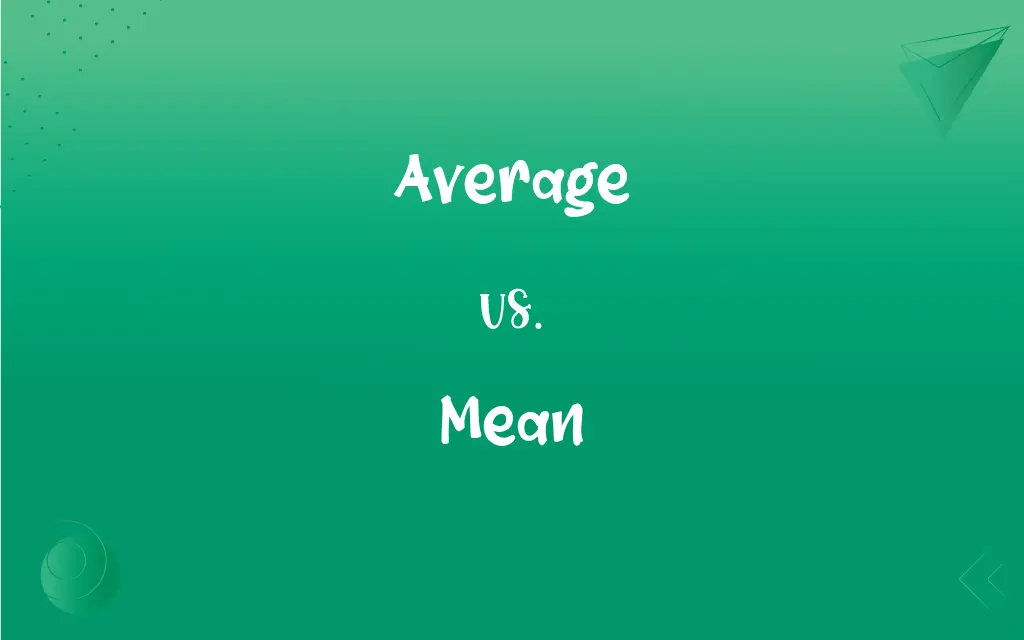Average vs. Mean: What's the Difference?
Edited by Aimie Carlson || By Harlon Moss || Published on December 14, 2023
The average is a general term for the central value of a data set, while the mean specifically refers to the sum of all values divided by their count.

Key Differences
Average is a broader term used in statistics to describe the central or typical value in a set of data. Mean, specifically, is a type of average calculated by adding all the numbers in a set and dividing by the number of values.
Average is an umbrella term that can include mean, median, and mode, while the mean is a specific calculation and does not vary. Mean is always calculated the same way, by summing values and dividing by their count.
The word 'average' is used in everyday language to describe something typical or ordinary, not just in statistical contexts. 'Mean', however, is primarily used in mathematical and statistical discussions.
In certain contexts, 'average' might be calculated differently, such as a weighted average where values have different weights. The mean, in contrast, always involves a straightforward arithmetic calculation.
In statistics, the mean is a precise measure used for analysis, while average can be a more general term used for a broader interpretation in various fields like economics, sociology, and sports.
ADVERTISEMENT
Comparison Chart
Definition
General term for central value
Sum of values divided by their count
Variability
Can include mean, median, mode
Always a specific calculation
Common Usage
Broader, non-technical contexts
Mostly in mathematical contexts
Calculation Complexity
Can vary (simple to complex)
Always simple arithmetic
Interpretation
General or typical value
Precise statistical measure
ADVERTISEMENT
Average and Mean Definitions
Average
It's used to describe something as ordinary or usual.
His performance was just average.
Mean
In probability, mean refers to the expected value.
The mean of a random variable helps in probability analysis.
Average
Average refers to the typical or central value in a data set.
The average score in the class was 75%.
Mean
Mean can be used in geometry to refer to an average position.
The mean point of a triangle is its centroid.
Average
Average can mean equally distributing among a number.
The cost was averaged among the group members.
Mean
Mean is also used in harmonic and geometric contexts in mathematics.
The geometric mean is different from the arithmetic mean.
Average
In sports, average indicates a player's typical performance.
His batting average this season is impressive.
Mean
It refers specifically to the arithmetic mean in statistics.
The mean income of the group was higher than the median.
Average
Average can also represent the result of adding quantities and dividing by the number of quantities.
The average temperature this week was lower than expected.
Mean
Mean is the sum of a list of numbers divided by the count of numbers.
The mean of 2, 4, and 6 is 4.
Average
A number that typifies a set of numbers of which it is a function.
Mean
To be used to convey; denote
"'The question is,' said Alice, 'whether you can make words mean so many different things'" (Lewis Carroll).
Average
See arithmetic mean.
Mean
To act as a symbol of; signify or represent
In this poem, the budding flower means youth.
FAQs
How is mean calculated?
Mean is calculated by summing all numbers in a set and dividing by the number of values.
Is mean used outside of mathematics?
Mean is primarily used in mathematical and statistical contexts.
Can average be non-numerical?
Yes, in non-statistical contexts, average can describe something typical or ordinary.
How does weighted average differ from mean?
Weighted average assigns different weights to values, while mean treats all values equally.
Is mean always a whole number?
No, mean can be a decimal or fractional number.
Can average be skewed by extreme values?
Yes, especially when average refers to the mean, extreme values can skew it.
Does average always represent the most common value?
No, that’s typically the mode; average can be different from the most common value.
Are average and mean always the same?
Not always; mean is a type of average, but average can refer to other measures like median and mode.
What is an average?
Average is a statistical measure representing the central or typical value in a data set.
Is the average useful in all types of data sets?
Average is useful, but its effectiveness depends on the distribution and nature of the data.
Do average and mean have different applications?
Yes, average is used more broadly, while mean has specific applications in statistics and mathematics.
How are average and mean used in sports statistics?
Average often refers to a player's typical performance, while mean can specifically refer to numerical averages like batting average.
Can average be misleading?
Yes, especially if it’s not clear which type of average (mean, median, mode) is used.
How do you find the mean in a frequency distribution?
The mean in a frequency distribution is found by multiplying values by their frequencies and dividing by the total number of data points.
Does mean consider the distribution of values?
Mean takes into account all values but doesn’t reflect their distribution across the data set.
Can average be zero?
Yes, if the sum of the values is zero, the average (mean) can be zero.
How do outliers affect the mean?
Outliers can significantly skew the mean, making it unrepresentative of the data set.
Why is mean important in data analysis?
Mean provides a concise summary of the central tendency of a data set.
Can the mean be the same as the median?
Yes, in symmetric distributions, the mean and median can be the same.
Is mean always relevant in statistical analysis?
Mean is widely used but may not always be the best measure, depending on the data distribution.
About Author
Written by
Harlon MossHarlon is a seasoned quality moderator and accomplished content writer for Difference Wiki. An alumnus of the prestigious University of California, he earned his degree in Computer Science. Leveraging his academic background, Harlon brings a meticulous and informed perspective to his work, ensuring content accuracy and excellence.
Edited by
Aimie CarlsonAimie Carlson, holding a master's degree in English literature, is a fervent English language enthusiast. She lends her writing talents to Difference Wiki, a prominent website that specializes in comparisons, offering readers insightful analyses that both captivate and inform.








































































